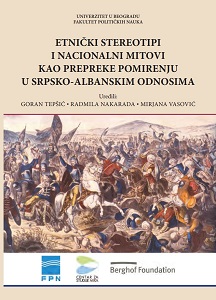
We kindly inform you that, as long as the subject affiliation of our 300.000+ articles is in progress, you might get unsufficient or no results on your third level or second level search. In this case, please broaden your search criteria.


It would be plausible to construct a ‘variety of communisms’ theory, categorizing the state-socialist economies not only by region but by historical epoch. China, for example, imitated the Stalinist model in the first years after the Revolution, but by the 1960s the PRC had developed its own unique social and economic institutions. The goulash communism of János Kádár’s Hungary, which took shape after 1956, differed drastically from the classical Soviet model. Nevertheless, during the last decades of state socialism, the communist societies were broadly on a convergence trajectory: the gap between Czechoslovakia or Hungary and the USSR, for instance, narrowed. State ownership of the means of production, the redistributive nature of economic integration and the political monopoly of the Communist Party created a homologous institutional environment. The system largely suppressed the legacies of pre-communist times.
More...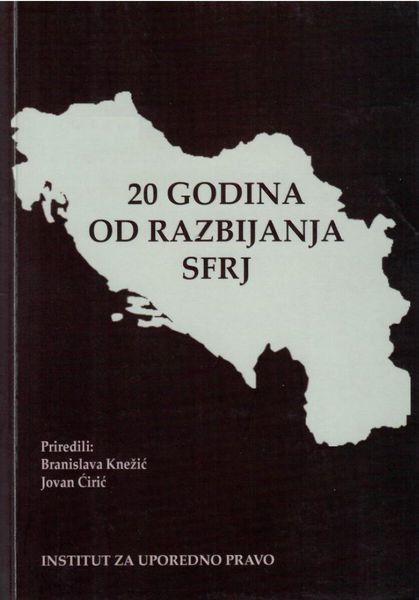
The problem of the relation of the Western World towards Serbs in the past two decades- refering not only to the problems of Kosovo and Metohia and the future of Republic of Srpska, the Hague or EU integrations, but also to the relation at more complex level- is not a result of Serbian idiosyncrasy, which do not match with clearly defined western principles. On the contrary, this problem is an outcome of some sort of the patology of postmodern Western world, that systematically deviates from those principles.
More...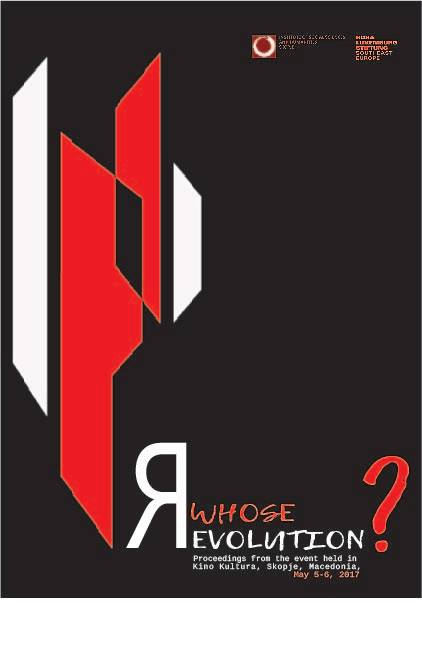
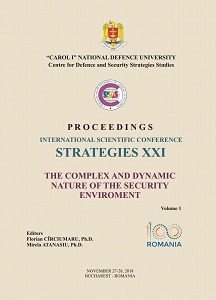
Over the last years, People’s Republic of China (PRC) has surpassed the United States of America (U.S.) as the world’s leading energy consumer and importer of oil.China’s relations with the Middle East become an important issue with global implications.This paper examines China’s interests in and its strategy towards the Middle East and what are the consequences for the U.S.. The aim is to find out to what extend China’s expanding presence in the Middle East poses a threat to the US security partnerships with Arab countries and the US military posture in the region. Even if China influence in the region has largely been economic, growing trade and investment also gives Beijing increased geopolitical stature. To achieve the intended purpose, the research framework will consist on a qualitative analysis based on case study method.
More...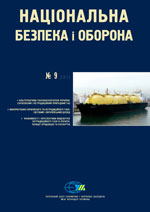
ALTERNATIVES FOR GAS SUPPLY OF UKRAINE: LIQUEFIED NATURAL GAS (LNG) AND NON-TRADITIONAL GAS // SECTION 1. WORLD LNG MARKETS AND OPPORTUNITIES FOR DIVERSIFICATION GAS SUPPLY OF UKRAINE // 1.1. WORLD LNG MARKETS: STATE, FEATURES, TRENDS // 1.2. LNG TRADE: FEATURES OF CONTRACTS AND PRICING // 1.3. MAIN FACTORS OF LNG COMPETITIVENESS // 1.4. PROSPECTS OF WORLD LNG TRADE // 1.5. PROSPECTS AND PROBLEMS OF LNG SUPPLY TO UKRAINE // SECTION 2. DEVELOPMENT OF NON-TRADITIONAL GAS MARKETS IN THE WORLD AND PROSPECTS OF UKRAINE // 2.1. WORLD NON-TRADITIONAL GAS MARKETS: OVERVIEW // 2.2. SALT GAS MARKET: STATE AND PROSPECTS OF DEVELOPMENT // 2.3. METHANE OF COAL DEPOSITS // 2.4. GAS OF DENSE COLLECTORS // 2.5. PROSPECTS FOR THE DEVELOPMENT OF THE HYDROGATE GAS MARKET // SECTION 3. CONCLUSIONS AND SUGGESTIONS // DIVERSIFICATION OF GAS SUPPLY OF UKRAINE: POSITIONS OF SPECIALISTS // POLAND IN SEARCH OF NEW SOURCES OF NATURAL GAS SUPPLY // SLATE PROSPECTS OF UKRAINE: THE REVOLUTION CANCELED // PROSPECTS OF NON-TRADITIONAL GAS IN UKRAINE AND IN THE WORLD // DETERMINATION OF PRIORITY LNG SUPPLIERS TO UKRAINE AND TERMS OF TRADE IN IT
More...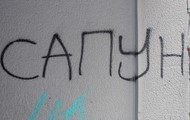
Prvi put sam čuo za korona viruse 1999. Njihovo lukavstvo se, pre svega, sastoji od ogromne dužine i složenosti njihovog RNK genoma. RNK je mnogo nestabilniji nego DNK i zato su RNK virusi obično kratki. Približno ih merimo u kilobazama (kb) podataka. Polio ima samo 7 kb, grip do 14, a ebola 19. Težak akutni respiratorni sindrom korona virusa 2 (Sars-CoV-2), koji je i uzročnik Covid-19, ima 30 kb. To je sasvim normalno za korona virus, ali je blizu hemijske granice za skladište informacija za RNK – približno onoliko koliko lanac RNK može da izdrži a da ne propadne. Zato su virusima potrebni dobri trikovi da bi preživeli.
More...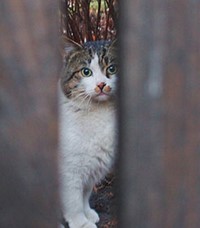
Mediji i narod lažu, a to ne treba da rade, kaže predsednik države, čije bezgranične ingerencije ne poznaje nijedan ustav neke postojeće parlamentarne države. I u pravu je, jer jedino on uzima sebi pravo da određuje šta je laž a šta istina, kako mu odgovara. Nikakvog drugog kriterijuma nema. I niko drugi nema takvog prava. Šta tu nije u redu? Tako radi Tramp u slučaju korona virusa: prvo je tvrdio da su problem izmislili demokrati; onda da virus nije ozbiljani da će brzo proći, i onda konačno da je to strani virus i da je unet iz Evrope, gde nisu uveli prave mere zaštite. Ako mislite da je to išlo bez šale i komike, pogledajte kako šef štaba za bolesti reaguje kad Tramp proglasi nekog drugog nadležnim za taj posao, i kako Tramp na demanti beži na zadnja vrata, sve pred kamerama!
More...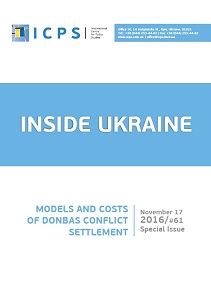
PUBLIC POLICIES: MODELS OF DONBAS CONFLICT SETTLEMENT // ECONOMIC ANALYSIS: COSTS OF DONBAS CONFLICT SETTLEMENT // POLITICAL COMPETITION: POSITIONS OF UKRAINIAN POLITICAL PARTIES REGARDING DONBAS CONFLICT SETTLEMENT
More...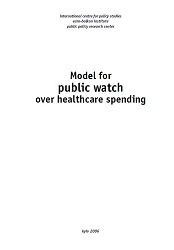
In Ukraine today, the environment for a dialog between the state and citizens on public control over public healthcare spending is almost entirely lacking. The reason for this is the absence of the necessary mechanisms, institutions, procedures and practices for public participation in the decision-making process within authorities. But extending democratic principles to healthcare is one way to improve publicpolicy in this area and raise the health of Ukrainian society in general. The development and institution of public control over public healthcare spending should be a reform priority. This, in turn, requires a set of clear, understandable and transparent rules and procedures. This manual presents a practical model for public control over public healthcare spending. The main requirements attached to this model are described in terms of legal and institutional arrangements for public control, the dissemination of information and the participation of NGOs in mobilizing the general public. Jointly prepared by specialists from the Euro-Balkan Institute (Macedonia), the Public Policy Research Center (Kazakhstan), and the International Centre for Policy Studies (Ukraine), the uniqueness of this publication lies in the fact that, during its preparation, public policy tools used in the European Union, Central Europe and Central Asia were examined.
More...
THE OPPOSITION IN UKRAINE // 1. THE OPPOSITION IN UKRAINE: GENERAL DESCRIPTION // 2. THE AUTHORITIES AND THE OPPOSITION IN UKRAINE // 3. LEGAL REGULATION OF THE STATUS OF THE PPOSITION, ITS RIGHTS AND GUARANTEES OF ITS ACTIVITY // 4. CONCLUSIONS AND PROPOSALS // POSITIONS OF THE POLITICAL LEADERS // THE OPPOSITION NOT ONLY MUST MAKE A DIAGNOSIS BUT ALSO OFFER A REMEDY // OUR OPPOSITION RESTS ON THE PEOPLE’S'S WILL // WE STRUGGLE FOR POWER NOT FOR POWER’S SAKE, BUT TO ENABLE OUR PEOPLE TO LIVE IN HAPPINESS, KINDNESS AND HARMONY // WE ARE NOT THE OPPOSITION, WE ARE AN ALTERNATIVE TO THE OFFICIAL POWER // "OUR UKRAINE" IS TO IMPLEMENT THE VOTERS’' WILL // POSITIONS OF REPRESENTATIVES OF POLITICAL PARTIES (BLOCS) ON THE EVE OF THE 2002 ELECTION // THE AUTHORITIES AND THE OPPOSITION: DOMESTIC EXPERIENCE // LESSONS OF THE REVOLUTION, WHICH DID NOT TAKE PLACE // THE AUTHORITIES AND THE OPPOSITION: FOREIGN EXPERIENCE // OPPOSITION IN THE SEIMAS OF THE REPUBLIC OF LITHUANIA: THE RIGHTS AND GUARANTEES OF ITS ACTIVITY // PARLIAMENTARY OPPOSITION IN THE REPUBLIC OF TURKEY: CONSTITUTIONAL GUARANTIES OF RIGHTS AND ACTIVITIES // PARLIAMENTARY OPPOSITION IN FRANCE: LEGISLATIVE SUPPORT AND TRADITIONS OF ACTIVITY // PROTECTION OF MINORITY RIGHTS IS ONE OF THE BASIC PRINCIPLES OF THE U.S. CONSTITUTION
More...
SOME ASPECTS OF PROFESSIONALISATION OF THE ARMED FORCES OF UKRAINE // TRANSITION TO PROFESSIONAL ARMED FORCES IN UKRAINE: THE PROBLEMS AND PROSPECTS // 1. FACTORS PROMPTING TRANSITION OF THE ARMED FORCES TO MANNING ON A VOLUNTEER BASIS AND PROMOTING IMPLEMENTATION OF THE PLANS OF TRANSISION // 2. FACTORS HINDERING TRANSITION OF THE ARMED FORCES OF UKPAINE TO MANNING ON A VOLUNTEER BASIS // 3. CONCLUSIONS AND PROPOSALS // A PROFESSIONAL ARMY IN UKRAINE: THE VIEWS AND ASSESSMENTS OF THE POPULATION // POSITIONS OF DOMESTIC EXPERTS // PROFESSIONAL ARMY NEEDS AN ADEQUATE FINANCING “PEOPLE'S ARMY” IS A FICTION // THE DEFENCE OF THE COUNTRY — FOR PROFESSONALS ONLY // CHANGES IN THE PROGRAMME OF COMBAT TRAINING OF THE LAND FORCES // A PROFESSIONAL ARMY REQUIRES A NEW HUMAN RESOURCES STRATEGY // ON THE PATH TOWARDS PROFESTONAL ARMED FORCES OF UKRANE // TRANSITION TO PROFESSIONAL ARMY REQUIRES A REFORMING OF RESERVE TRAINING SYSTEM // THE STATE OF FUNDING OF THE ARMED FORCES OF UKRAINE // PROFESSIONALISM OF THE ARMED FORCES OF UKRAINE: THE LEGAL ASPECT // PROFESSIONALISM OF THE ARMY: THE MYTHS AND REALITIES // POSITIONS OF FOREIGN EXPERTS // SOUTH AFRICA'S EXPERIENCE IN PROFESSIONALISATION OF THE ARMED FORCES // THE MILITARY VOLUNTARY SERVICE IN THE ARGENTINE ARMY // RESHAPING EUROPEAN ARMED FORCES FOR THE 21st CENTURY // SCENARIOS OF RUSSIAN ARMY TRANSITION TO PROFESSIONAL BASIS // PROFESSIONAL ARMY OF THE REPUBLIC OF BELARUS: “FOR” AND “AGAINST” // THE ALL-VOLUNTEER FORCE IN EASTERN EUROPE: WHEN THE ARMED FORCES MEET SOCIETY // PROFESSIONALISATION: A REVISIONIST CRITIQUE // STATE PROGRAMME OF TRANSITION OF THE ARMED FORCES OF UKRAINE TO MANNING WITH CONTRACTED SERVICEMEN
More...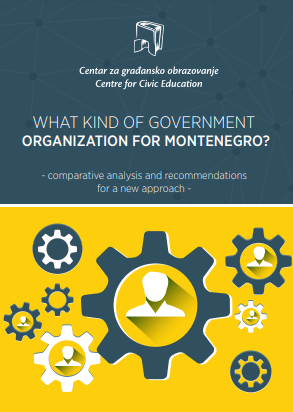
Organization, functionality and transparency of the executive branch has an overwhelming influence on the quality of political decisions, and consequently the quality of life of all citizens, via their attitude to and management of the public interest and resources. Every country determines, in accordance with its own legal framework, the structure and organization of its executive, depending on the policy priorities and goals set by the government itself, and preferrably in accordance with the real needs and possibilities. Practices differ, and so do the results. What kind of Government does Montenegro need? What is the role of inner cabinets, what are their advantages and disadvantages? How much do the members of the Government and advisors to the inner cabinet cost? How can we reach an effective organization of the government that is accountable to the citizens? These were some of starting questions that motivated the team of the Centre for Civic Education’s (CCE) to review the current system of organisation of the Montenegrin Government, with a focus on the inner cabinet and number of ministries, and compare them to some of the neighbouring countries, some EU member states, as well as to some third countries that for varous reasons could act be role models to Montenegro. We compared Montenegro to Serbia, Croatia, Slovakia, Germany and Iceland. The choice of these countries follows a clearly defined methodological research framework, in order to include candidate states, members of the European Union, as well as third countries. Specifically, for the purpose of comparative analysis, Serbia was selected as an EU candidate state, Croatia as the last member state that acceded to the EU, Slovakia as the country currently in charge of the EU presidency (since 1 July, 2016) and FR Germany as one of the founders of the EU, but also Iceland as a country that is not currently aspiring to join the EU, but whose size makes for a relevant comparison to Montenegro. This analysis is part of regular activities of the CCE within the sub-programme Accountability and Transparency of Authorities.
More...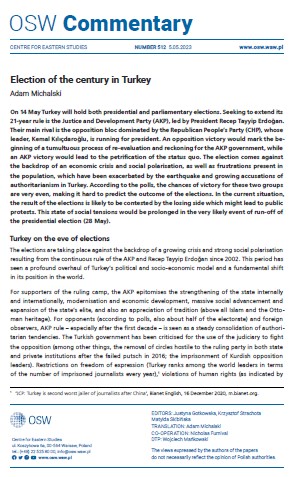
On 14 May Turkey will hold both presidential and parliamentary elections. Seeking to extend its21-year rule is the Justice and Development Party (AKP), led by President Recep Tayyip Erdoğan. Their main rival is the opposition bloc dominated by the Republican People’s Party (CHP), whose leader, Kemal Kılıçdaroğlu, is running for president. An opposition victory would mark the beginning of a tumultuous process of re-evaluation and reckoning for the AKP government, while an AKP victory would lead to the petrification of the status quo. The election comes against the backdrop of an economic crisis and social polarisation, as well as frustrations present in the population, which have been exacerbated by the earthquake and growing accusations of authoritarianism in Turkey. According to the polls, the chances of victory for these two groups are very even, making it hard to predict the outcome of the elections. In the current situation, the result of the elections is likely to be contested by the losing side which might lead to public protests. This state of social tensions would be prolonged in the very likely event of run-off of the presidential election (28 May).
More...
Miloš Zeman will complete his second presidential term in March 2023. He will be replaced by one of eight candidates who will face off in the January elections. The first round of voting will take place on 13–14 January, with a second round on 27–28 January very likely. Among the contenders, three favourites stand out: two figures from outside politics will face ex-Prime Minister Andrej Babiš (ANO) – General Petr Pavel, the former chairman of the NATO Military Committee; and Danuše Nerudová, the former rector of the Mendel University in Brno and a professor of public finance. Recent polls rule out the possibility of any candidate winning in the first round. If Nerudová’s campaign does not regain momentum, the second round will almost certainly feature Pavel and Babiš, the latter of whom has a disciplined group of voters. However, the former prime minister has limited chances of success there due to his large negative electorate.
More...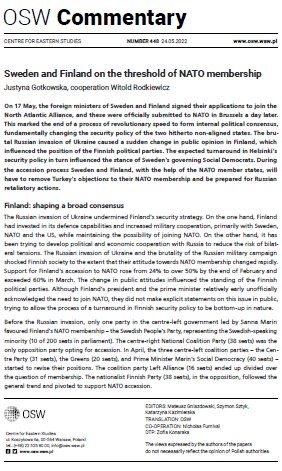
On 17 May, the foreign ministers of Sweden and Finland signed their applications to join the North Atlantic Alliance, and these were officially submitted to NATO in Brussels a day later. This marked the end of a process of revolutionary speed to form internal political consensus, fundamentally changing the security policy of the two hitherto non-aligned states. The brutal Russian invasion of Ukraine caused a sudden change in public opinion in Finland, which influenced the position of the Finnish political parties. The expected turnaround in Helsinki’s security policy in turn influenced the stance of Sweden’s governing Social Democrats. During the accession process Sweden and Finland, with the help of the NATO member states, will have to remove Turkey’s objections to their NATO membership and be prepared for Russian retaliatory actions.
More...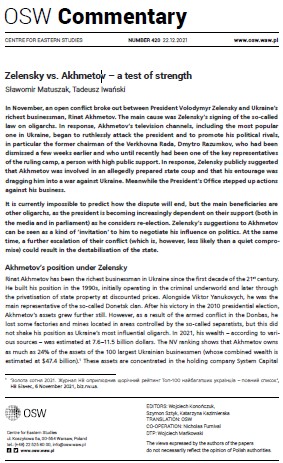
In November, an open conflict broke out between President Volodymyr Zelensky and Ukraine’s richest businessman, Rinat Akhmetov. The main cause was Zelensky’s signing of the so-called law on oligarchs. In response, Akhmetov’s television channels, including the most popular one in Ukraine, began to ruthlessly attack the president and to promote his political rivals, in particular the former chairman of the Verkhovna Rada, Dmytro Razumkov, who had been dismissed a few weeks earlier and who until recently had been one of the key representatives of the ruling camp, a person with high public support. In response, Zelensky publicly suggested that Akhmetov was involved in an allegedly prepared state coup and that his entourage was dragging him into a war against Ukraine. Meanwhile, the President’s Office stepped up actions against his business.
More...
Russia’s ruling elite believes that the outcome of the US presidential elections will have only a negligible impact on Washington’s policy towards Moscow, because the American establishment is convinced that Russia under Vladimir Putin has consistently pursued an anti-American policy. In Russia’s view, each candidate has both strong and weak points, but in the end the Kremlin would prefer to see Donald Trump remain in the White House. To this end, Moscow has been active – particularly in the sphere of propaganda – with the aim of weakening Joe Biden’s candidacy and stoking domestic tensions in American society. However, the scope of Russia’s activity seems more limited compared to the previous electoral campaign. However, Moscow is likely to step up its activities should a political conflict emerge over the outcome of the election. A victory for the Democratic presidential candidate will result in revisions in US policy towards Russia. The incoming Biden administration can be expected to combine tough rhetoric on its divergences with Russia in the field of values with attempts to find areas where their interests converge and where cooperation can take place (such as arms control, the resolution of regional conflicts and the fight against terrorism), complemented by efforts to coordinate the West’s policy towards Russia.
More...
Turkey’s next presidential and parliamentary elections are scheduled for 18 June 2023. These elections constitute a critical juncture for Turkey’s future. They will either put an end to or consolidate the 20 years of the Justice and Development Party (AKP) rule in the country. Due to a worsening economic crisis and a deepening refugee question, the government policies have lost significant levels of public support in the last two years. Yet, the elections in Turkey are held under unfair conditions due to the government control of the media, misuse of state resources and the vast powers that the executive has over the judicial authorities. The amendments introduced in the election law in April 2022 and the disinformation bill that passed in October 2022 create further advantages for the government in terms of increasing its control over the electoral process. Under these conditions, the success of the oppositional alliances depends on two criteria. First, the alliances must become unified in terms of supporting a joint candidate in the presidential elections both among and within themselves. Second, they must spend extraordinary effort to mobilize the undecided and protest voters, which would give a strong message of their determination to win the elections. If the opposition wins the elections, there will be a new window of opportunity for the EU and the new Turkish administration to prepare the grounds for a positive, stable relationship. Yet, the EU should not expect a speedy recovery in the relations due to mixed stances within the opposition and the recurrent societal perceptions that ‘the EU is biased towards Turkey. ’If the current government is re-elected, the EU should prepare itself for an increased frequency of escalated political tensions with Turkey. The EU should aim to develop a new interest-based framework to cooperate with Turkey in the areas of trade, migration, border protection and energy.
More...
The issue of migration in Serbia has been approached fatalistically in the last few years, by often presenting information that is not completely accurate in order to create the image that especially the most talented are leaving Serbia. The reality is different: the educational structure of people leaving the country is similar to the level of education of the resident population (Arandarenko, 2022). Nevertheless, the pressure coming from the public was transferred to the decision-makers, which motivated the adoption of the first migration strategy in 2019, which focused almost entirely on ways to prevent population outflow. A little later adopted Economic Migration Strategy of the Republic of Serbia for the period 2021-2027 softened the tone of the first version of the document, but the measures adopted due to concerns about the so-called “brain drain” phenomenon sought to encourage the return of highly educated individuals to Serbia.
More...